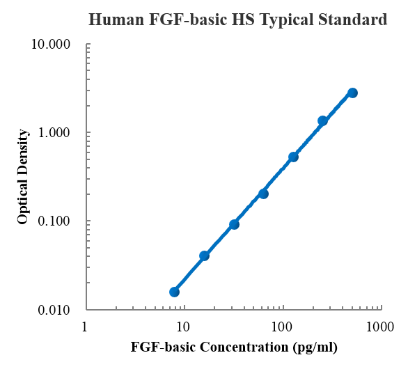
Human FGF-basic High Sensitivity ELISA Kit
$380.00 – $480.00
| Sample Type | Serum, plasma, cell culture supernatant, and other biological samples |
|---|---|
| Sample Volume | Serum, plasma: 20 μL;cell culture supernatant: 100 μL |
| Sensitivity | 0.04 pg/mL |
| Range | 7.81 pg/mL – 500 pg/mL |
| Assay Time | 3.5 h |
| Recovery | 86% – 97% |
| Average Recovery | 0.9 |
| Intra Precision | 3.2% – 5.2% |
| Inter-Precision | 3.5% – 6.4% |
| Platform | ELISA |
| Plate | Detachable 96-well plate |
| Size | 96T/48T |
| Storage | If the reagent kit is unopened, it should be stored at 4℃. However, if it has been opened, the standard solution should be stored at -20℃, while the other components should be stored at 4℃. |
| Delivery | 4℃ blue ice transportation |
| Components | 96-well polystyrene enzyme-linked immunosorbent assay (ELISA) plate coated with anti-FGF-basic monoclonal antibody Human FGF-basic freeze-dried standard FGF-basic detect Antibody Standard Diluent HRP-labeled streptavidin Signal enhancer concentrate Signal enhancer diluent Assay Buffer(10×) Substrate TMB Stop Solution Washing Buffer(20×) Sealing Film |
| Assay Principle | This kit utilizes the double antibody sandwich enzyme-linked immunosorbent assay (ELISA) detection technique.Specific anti-human FGF-basic antibodies are precoated on a high-affinity ELISA plate.Standards and test samples are added to the wells of the ELISA plate. After incubation, the FGF-basic present in the samples binds to the solid-phase antibodies. After washing to remove unbound substances, biotinylated detection antibodies are added and incubated. After washing to remove unbound biotinylated antibodies, streptavidin-HRP labeled with horseradish peroxidase is added. After washing again, a signal enhancer is added and incubated. After washing to remove unbound substances, Streptavidin-HRP is added once more. After washing, a colorimetric substrate, TMB, is added and the plate is incubated in the dark for color development. The intensity of the color reaction is directly proportional to the concentration of FGF-basic in the samples.A stop solution is added to terminate the reaction, and the absorbance value is measured at a wavelength of 450 nm (with a reference wavelength range of 570-630 nm). |
Targets
FGF2
FGF2 Target Infomation Overview
- Target Symbol: FGF2, fibroblast growth factor 2
- Gene Groups: Receptor ligands; Fibroblast growth factor family
- Previous Names: FGFB
- Alias Names: fibroblast growth factor 2 (basic)
FGF2, fibroblast growth factor 2 Target Infomation by Species
[su_tabs][su_tab title=”Human” disabled=”no” anchor=”” url=”” target=”blank” class=”tab-human”]
Human FGF2 Target Information
- Target Symbol: FGF2, fibroblast growth factor 2
- Alias:
- basic fibroblast growth factor bFGF
- BFGF
- FGF-2
- FGFB
- fibroblast growth factor 2 (basic)
- HBGF-2
- heparin-binding growth factor 2
- prostatropin
- NCBI_Gene: 2247
- UniProtKB: P09038
Human FGF2 Predicted Functions
Enables several functions, including identical protein binding activity; nuclear receptor coactivator activity; and signaling receptor binding activity. Involved in several processes, including positive regulation of cell population proliferation; positive regulation of intracellular signal transduction; and regulation of cell migration. Acts upstream of or within positive regulation of cell fate specification and positive regulation of cell population proliferation. Located in extracellular space. Implicated in several diseases, including Parkinsonism; corneal neovascularization; diabetic neuropathy; gastric ulcer; and impotence. Biomarker of several diseases, including artery disease (multiple); breast cancer (multiple); carcinoma (multiple); eye disease (multiple); and female reproductive organ cancer (multiple).
[/su_tab]
[su_tab title=”Mouse” disabled=”no” anchor=”” url=”” target=”blank” class=”tab-mouse”]
Mouse Fgf2 Target Information
- Target Symbol: Fgf2, fibroblast growth factor 2
- Alias:
- bFGF
- Fgf-2
- Fgfb
- fibroblast growth factor, basic
- NCBI_Gene: 14173
Mouse Fgf2 Predicted Functions
Enables growth factor activity. Involved in stem cell development. Acts upstream of or within several processes, including animal organ development; positive regulation of macromolecule metabolic process; and positive regulation of signal transduction. Located in extracellular space. Is expressed in several structures, including alimentary system; central nervous system; extraembryonic component; genitourinary system; and sensory organ. Human ortholog(s) of this gene implicated in several diseases, including Parkinsonism; corneal neovascularization; diabetic neuropathy; gastric ulcer; and impotence. Orthologous to human FGF2 (fibroblast growth factor 2).
[/su_tab]
[su_tab title=”Rat” disabled=”no” anchor=”” url=”” target=”blank” class=”tab-rat”]
Rat Fgf2 Target Information
- Target Symbol: Fgf2, fibroblast growth factor 2
- Alias:
- angiogenesis promoting growth factor
- basic fibroblast growth factor
- bFGF
- Fgf-2
- Fgf2a
- fibroblast growth factor 2a
- HBGF-2
- heparin binding growth factor
- heparin-binding growth factor 2
- NCBI_Gene: 54250
Rat Fgf2 Predicted Functions
Enables fibroblast growth factor receptor binding activity. Involved in several processes, including angiogenesis involved in coronary vascular morphogenesis; paracrine signaling; and positive regulation of cell population proliferation. Acts upstream of or within fibroblast growth factor receptor signaling pathway. Located in cytoplasm; extracellular space; and nucleus. Used to study pulmonary hypertension. Biomarker of bladder disease; decubitus ulcer; diabetic retinopathy; hypertension; and retinal vein occlusion. Human ortholog(s) of this gene implicated in several diseases, including Parkinsonism; corneal neovascularization; diabetic neuropathy; gastric ulcer; and impotence. Orthologous to human FGF2 (fibroblast growth factor 2).
[/su_tab][/su_tabs]
FGF2 Target News
[catlist tags=”fgf2″ template=targetnews thumbnail=yes thumbnail_class=”related-post-media clr” thumbnail_size=833]





